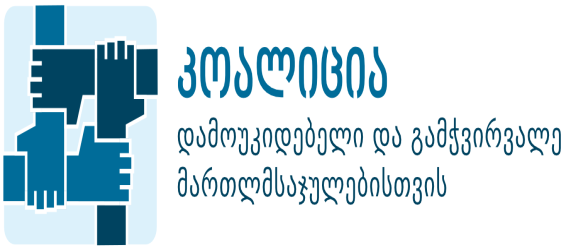
On 7 July 2015 Venice Commission, Consultative Council of European Prosecutors (CCPE) and OSCE Office for Democratic Institutions and Human Rights (OSCE/ODIHR) issued a preliminary joint opinion on the draft amendments to the Law on Prosecutor’s office of Georgia. Prior to the issuance of the opinion, the Coalition for Independent and Transparent Judiciary had evaluated the draft amendments reforming the prosecution system that were proposed by the Ministry of Justice and supported by the Government of Georgia. Additionally, the Coalition had the opportunity to present its detailed opinion on the prosecution reform to the Venice Commission.
The preliminary joint opinion of the Venice Commission, Consultative Council of European Prosecutors (CCPE), and OSCE Office for Democratic Institutions and Human Rights (OSCE/ODIHR) (henceforth: preliminary opinion) states, that the prosecution reform initiated by the Government of Georgia is a step in the right direction, however, it stresses that the proposed reform does not yet fully ensure the stated objective of the Government to ensure full depoliticization of the prosecution system. The preliminary opinion gives recommendations, which are largely in line with the opinion of the Coalition, that the proposed reform is insufficient for full depoliticization of the prosecution system.
The Coalition would like to underline the main points and recommendations of the preliminary opinion, which we view as necessary for real reform of the prosecution system:
- The Chief Prosecutor’s appointment procedure is lacking in legitimacy, and political elements still prevail. The influences from the political forces, Government, and the Parliamentary majority on the selection process must be reduced;
- Discretionary authority of the Justice Minister to nominate the Chief Prosecutor’s candidacy to the Prosecutorial Council must be balanced. On the one hand requirements regarding professionalism and experience for the Chief Prosecutor must be established. On the other hand, The Minister of Justice must be obliged to propose not one, but several candidates to the Prosecutorial Council, from among which they then choose one;
- The preliminary opinion notes the importance of creating the Prosecutorial Council and the improvements this entails, however it also notes the deficiencies of the proposed model of the Prosecutorial council. The main issue here is the independence of the Prosecutorial Council and the rules for its establishment. Specifically:
- The institutional status of the Prosecutorial Council and the degree of independence of the institution and its members is unclear according to the proposed model. The Prosecutorial Council’s existence within the system of the Ministry of Justice does not correspond with the main objective of creating the Council, to ensure depoliticization of prosecutorial system and its independence from executive and legislative branches. Independence of the Prosecutorial Council is further made uncertain by the fact that the Minister of Justice is the chair of the Prosecutorial Council. The preliminary opinion recommends that the chair is selected by the Council, from among its members.
- Given the wide political participation in the process of forming the Prosecutorial Council, the preliminary opinion stresses the need for creating mechanisms to ensure that the negative effects of such political involvement are reduced, specifically including the greater participation of the professional and civil society organization representatives in the work of the Prosecutorial Council. The preliminary opinion also notes the wide-ranging authority of the Justice Minister in her role as the Chair of the Prosecutorial Council (chairing the Council meetings, nominating the candidates for Chief Prosecutor, votes for the candidate nominated by her, etc.) and stresses the need for reducing this authority.
- The draft calls for the appointment of 4 members of the Prosecutorial Council by the Parliament, by a simple majority vote. The preliminary opinion notes, that with this proposed draft the ruling political power will have a majority in the Council (5 out of 9 members). Given this, the opinion negatively evaluates the simple majority rule for the Council’s decision-making, which will allow the ruling political power to hinder major decisions (e.g. appointment of the Chief Prosecutor candidate).
- The preliminary opinion positively assesses the participation of two representatives of academic and civil society circles in the work of the Prosecutorial Council, as one mechanism for depoliticizing the Council. However, the preliminary opinion notes that the selection of these two representatives must be transparent and clear criteria must be set for eligibility to nominate them.
- According to the preliminary opinion the rules for selecting members of the Prosecutorial Council by the Conference of Prosecutors must be refined. Specifically, the right to nominate prosecutor-members of the Council must not be reserved exclusively for the senior officials – heads of Departments. Instead, the openness of the process and participation of prosecutors of all levels must be ensured.
- The preliminary opinion details the ambiguities in the process of dismissing the Chief Prosecutor and recommends refining the procedures in such a way that ensures real accountability of the Chief Prosecutor;
- According to the preliminary opinion, the draft amendments do not sufficiently clearly prohibit involvement of the executive branch in the investigation of individual criminal cases, and hence require further improvement.
The Coalition believes that considering the criticism and recommendations expressed in the preliminary opinion will be crucial for depoliticizing the Prosecution system in Georgia and ensuring its independence, as well as successfully implementing the initiated reforms. We hope that the Georgian government will heed the valuable recommendations of the Venice Commission as well as the civil society for implementing the real reform of the Prosecution system.

